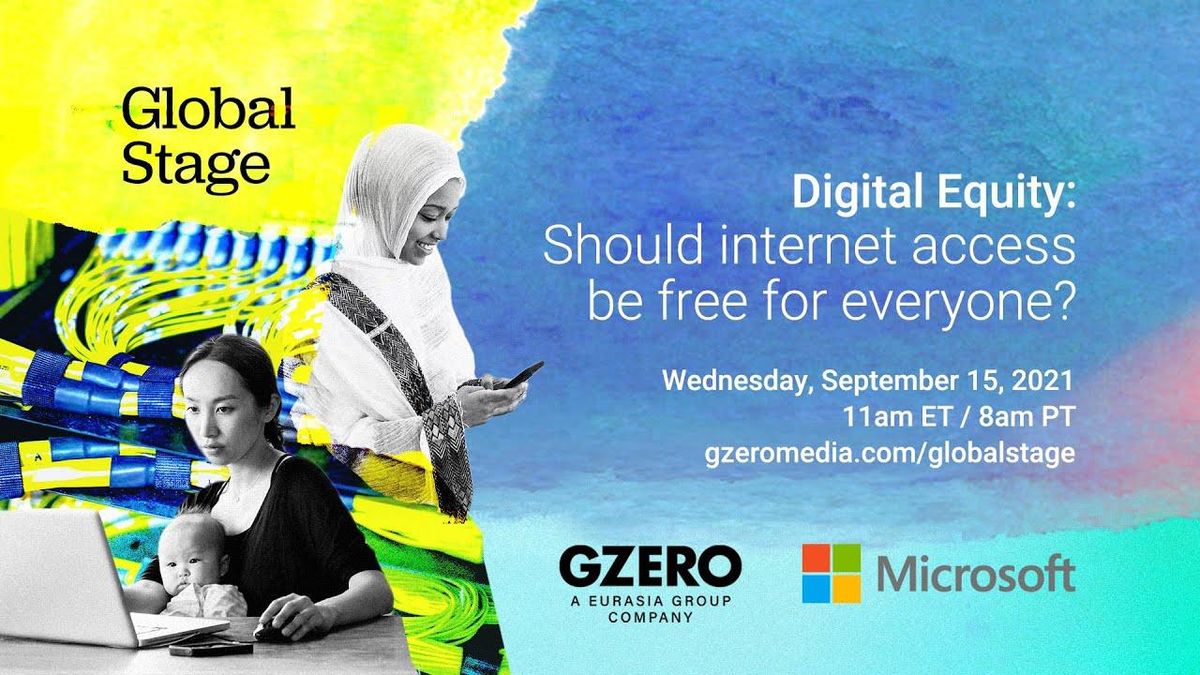We're back!
On Wednesday, September 15th, Global Stage returns to the UN General Assembly for a series of critical discussions facing governments, societies and economies.
GZERO Media and Microsoft launched the virtual series in 2020, during the peak of the pandemic, to ask tough questions and determine how united countries were in the fight against COVID-19.
12 months on, progress has been fitful. The delta variant has forced many countries back into lockdown; the virus has taken an extreme toll on fragile communities and developing nations; the disparity in access to vaccines between rich and poor countries is extreme; and the IPCC claims that climate catastrophe is on track. The pandemic has exacerbated racial, gender, and socioeconomic inequality and pushed many into unemployment and poverty.
Join us for live virtual events together with world leaders in politics, business, science and technology to debate how to achieve digital equity, whether inclusive recovery is a realistic goal, the growing threat of disinformation, and priorities for COP26.
Stay informed about further Global Stage discussions: sign up for updates and reminders about GZERO Media's events.
Digital Equity: Should Internet Access Be Free for Everyone?
Wednesday, September 15, 11am ET
- Melissa Fleming, UN Under-Secretary General (moderator)
- Amaka Anku, Practice Head, Africa, Eurasia Group
- Jessica Rosenworcel, Acting Chairwoman, Federal Communications Commission
- Doreen Bogdan-Martin, Director, ITU Telecommunication Development Bureau
- Vickie Robinson, General Manager, Microsoft Airband Initiative
- Vuyani Jarana, Chairman, Mobax Group
Unfinished Business: Is the World Really Building Back Better?
Wednesday, September 22, 11am ET
- Susan Glasser, staff writer and Washington columnist, The New Yorker (moderator)
- Ian Bremmer, President and Founder, Eurasia Group & GZERO Media
- Brad Smith, President and Vice Chair, Microsoft
- Michelle Bachelet, United Nations High Commissioner for Human Rights
- Dr. Michael Ryan, Executive Director, WHO Health Emergencies Programme
- David Malpass, President, World Bank Group
Infodemic: Defending Democracy Against Disinformation
Wednesday, October 13, 11am ET
- Yasmin Green, Director, R&D, Jigsaw
- Ginny Badanes, Director of Strategic Projects, Cybersecurity & Democracy, Microsoft
- Matt Masterson, Non-Resident Policy Fellow, Stanford Internet Observatory
- Nina Jankowicz, Director of External Engagement, Alethea Group & Global Fellow, Wilson Center
- Kevin Allison, Director, Geo-technology, Eurasia Group
- Richard Stengel, former Under-Secretary for Public Diplomacy and Public Affairs, Obama Administration
Climate Crisis: is net zero really possible?
Tuesday, November 2, 11am ET
- Gerald Butts, Vice Chairman, Eurasia Group
- Katharine Hayhoe, Director, Climate Science Center
- Naoko Ishii, Director, Center for Global Commons
- Lucas Joppa, Chief Environmental Officer, Microsoft
- Catherine McKenna, Minister of Infrastructure and Communities, Government of Canada
Click below to add all GZERO Media events to your calendar:
For more updates, follow us on LinkedIn | Twitter | Facebook | Instagram | YouTube.
- A (global) solution for cybercrime - GZERO Media ›
- Join us September 15 to decide: should internet access be free? - GZERO Media ›
- Should internet be free for everyone? A Global Stage debate - GZERO Media ›
- GDP should reflect cost of polluting planet, says Microsoft's John Frank - GZERO Media ›
- Digital Equity: Should Internet Access Be Free | Global Stage ›
- A (global) solution for cybercrime - GZERO Media ›


















